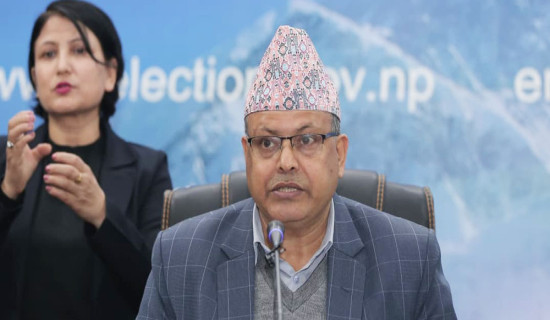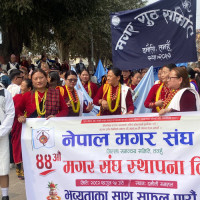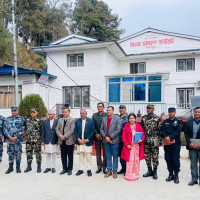- Saturday, 28 February 2026
Overcoming Nepal’s Democratic Dilemmas
Nepal is facing a long-drawn-out political transition. Nepalis’ struggle for freedom has enabled leadership to establish multi-party democracy in the nation. But their aspiration for justice and peace lingers. Non-partisan democracy is unthinkable but excessive partisan passion in the performance of the polity is bound to erode democratic rationality, individual autonomy and loyalty of people to the Nepali state, the very foundation of modern polity. Undue party-mindedness robs the notion of nationality and creation of common ground vital for the mitigation of social, economic and political rifts. It has set odds with aspiration-driven democratic idealism and constitutional realism.
The politicisation of all non-political and state institutions supposed to act in the general interest of the people has enfeebled them to act fairly and stand above interest groups. A democratic dilemma has crept in as Nepali people are required to make critical knowledge for judgments on political affairs but are deprived of free sources of information to make rational choices. They rely on the advice of the opinion makers or are seduced by other incentives. This has set a tension between the imperative of active participation of Nepalis in the political process and their civic efficacy, a belief that their action affects the outcome of politics.
Political socialisation
In Nepal, common processes of political socialisation are vital for several reasons: first, Nepal has adopted an adversarial model of political system which fragments the political sphere between the government and various layers of oppositions, not just parliamentary where each compete for its position, power and space in the polity and even outside. The purpose of adversarial politics is to make Nepali democracy a non-zero-sum game, provide scope for countervailing power to arrest the arbitrary act of the ruling party and create a stake of all sides in the democracy so that they do not pose extra-parliamentary and extra-constitutional challenges to the governance.
Second, the party boom in Nepal has stratified the societies into several political support bases each rivalling for resource, power and recognition. Third, the ancillary organisations of political parties have strengthened the identitarian politics focusing on the essence of differentiation thus posing problems for social and national integration. Frequent political agitations of subsidiary identity groups in Nepal often spark the imagination of people about the condition of living and the state of national affairs where powerful interest groups manipulate the polity to render it dysfunctional to respond to the non-negotiable demands of the powerless.
In a heterogeneous population like Nepal, introduction of proportional election systems and social inclusion is natural to provide representative semblance to all strata of population. But it has posed another dilemma. It undercuts the possibility of emergence of a dominant party for the formation of single-party government necessary for political stability in the nation while in a coalition politics small parties are tempted to resort to free-riding tendencies thus eroding the efficacy of effective, accountable, responsive and stable governance. Political pundits find procedural flaws in the proportional system. It became a victim of cronyism and patronage politics of top leadership rather than making parliament a mosaic of Nepali nation.
Nepali constitution has posed yet another dilemma: first it cannot strengthen democratic institutions owing to the enormity of rights against few duties. It has made politics aspiration-driven and opposition-friendly, not favourable to the stability of governance. When the system is defective, laws and procedures alone cannot correct it. Second, legislators’ interest in the executive domain of constituency development rather than law making has upset the separation of power. Third, the political culture of changing the constitution and institutions through outside the parliamentary process has established the legitimacy of agitation over the legal system.
Obviously, in a democratic polity the legitimacy of the opposition party rests on its alternative ideals and policies and healthy skepticism regarding the performance of ruling parties. But when it is a part of the establishment people look for alternative sources to articulate their grievances. Political institutionalisation matters to make institutions and leadership virtuous, capable of performing well within the constitutional culture and fostering general good for all people, not just those in power by nexus politics. Proper disposition of democratic will can overcome the anomic politics veering towards combat, jealousy, acquisitive impulse which is by no means cooperative and compromise based.
Power equation based model of all Nepali constitutions has habitually created a paradox: it supports only those who are beneficiary of the status quo. New political parties emerging outside it are challenging the political order on the basis of universal reason of ownership and participation in the political process. Rastriya Swotantra Party (RSP), Rastriya Prajatantra Party (RPP) and a host of regional parties can be taken as examples. The recent demands for constitutional amendment are bending around party act, electoral system and reduction of the size of politicians in the provincial and federal structures.
But the process has yet to move forward as Maoist-Centre and Madhesh-based parties prefer the existing model and, therefore, acting against their interest may push Nepali politics to downward spiral. Similarly, in a climate of distrust and deference barriers within party hierarchy even top leaders of ruling parties have not initiated informed debate and identified areas requiring constitutional amendment. Large scale collective action on constitutional amendment entails broad-based deliberation across all the politically significant forces of society.
Ironically, Nepali politicians resort to the old habits to make politics as usual even in critical times when the critical masses of society and obstreperous actors simmering with discontent are stoking the emotion of silent people. The most breath-taking failure in Nepali politics is the sign of retardation of desirable indicators of progress and ruffled the emotion of political forces representing cluster of political parties of Madhesh, RSP, RPP, radical left parties, Dalits and demand articulating professional organisations of teachers, victims of cooperatives etc. They have generated stressful situations in the parliament and streets where geopolitical forces are watching the play of high political dynamics.
Governance in a high-pressure situation and fluid political dynamics requires transformation of this condition into moderation so that democratic system finds its balanced adaptation. Democracy provides a broad platform hospitable for dialogue on shared public and national interests and mutual respects. Yet the political culture of double standards has set another dilemma between personal preference of leaders for negation of the other and the constitutional provision of inclusion.
Social media often debunks the gaps between what Nepali leaders rationalise about the performance of the polity against peoples’ unrealized constitutional rights and needs. Autonomous media frequently report about the increasing costs of politics as special interest groups capture the supply side of policy making in the nation thus leaving the living condition of the majority of the poor unchanged even with the change of superstructures. Nepali parties face problems in delinking interest groups acting as lubricants of high politics.
If Nepali democracy is to become efficient it must have to resolve all dilemmas, unleash productive forces of society for economic development, build the integrity of political and state institutions and keep ecological and social resilience so that ordinary people are not crushed by the burden of poverty, debt and dependence on international labour market for livelihood, relish proper education, affordable health care and social and cultural opportunities. These factors help them to adapt to accelerating technological change which is also changing the nature of Nepali society, economy and politics in a self-chosen direction.
Traditional moral teaching
Its traditional moral teaching of duty, morality and sociability is to be recharged which is being replaced now by efficiency, rationality and cut-throat competition where the poor do not find any space other than race to the bottom and create a sub-culture thus causing democratic atrophy. By contrast, self-justification of leadership, allied with a culture of blaming others for its own flaws and failures rather than social learning, has generated surmounting barriers to political reforms and progress. In Nepal, it is important for leaders to treasure institutional memory and knowledge of success or failure running the statecraft to pass on to new generations so that they can learn from the mistakes.
The deepest irony of Nepali leaders is why they cannot translate their electoral success and political promises to institutional performance in the life of people although they know that miscarriage in performing institutional tasks can cost their electoral victory in the next elections and traumatise public opinion thus generating widespread cynicism and apathy. When smart leaders of the nation turn sullen, it weakens the legitimacy of the polity and devalues them, evidence challenges their belief and promise of ideology for better life and liberty.
(Former Reader at the Department of Political Science, TU, Dahal writes on political and social issues.)

















